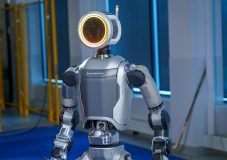The belief that robots will replace human workers is fairly widespread. Researchers from the Brookings Institution surveyed more than 1,500 internet users on their thoughts about AI, and the results were somewhat predictable. A mere 12 percent suggested that jobs would be created, and 13 percent believed AI would have no effect. These are small numbers indeed compared with the 38 percent who believed jobs would be eliminated, while 37 percent weren’t sure.
It’s easy to see why such an attitude is prevalent: Driverless cars are already a reality in some areas, and the self-checkout line at the supermarket has become almost ubiquitous in all kinds of retail outlets. Still, rare indeed is the customer who makes it through the bagging process without needing at least one employee interaction, whether it’s a software override or an ID check for that Merlot. Instead of cutting employees with the adoption of self-checkout technology, they’ve just been trained to do different jobs.
That’s why taking a closer look at the data shows a reality that is much easier to digest. I believe about 47 percent of jobs might be impacted by AI, but that doesn’t mean the entire job will be eliminated. My estimate is that only about 9 percent of jobs are at risk of full replacement, while the majority will be amplified by AI. In many instances, AI will even create jobs.
The jobs at which AI excels are typically high-frequency, high-volume, and repetitive, enabling the platforms to learn. While humans have historically feared technology, it has ultimately helped us evolve into a more productive society as a whole. AI is no exception, and it is crucial for as many people as possible to join the journey.
The Benefits of AI in Action
While many aspects of AI’s impact have been covered exhaustively — like the advent of driverless cars — other areas have yet to be fully discussed. The impact that the technology will have on education, for example, is of particular importance. The implementation of AI is shifting the skills humans need, so the way they are educated will need to change. New collaborations are forming across the academic landscape to bridge this gap.
For example, education and career transformation pioneer General Assembly is forging partnerships with traditional academic institutions such as the University of Oxford’s Said Business School as well as large employers such as L’Oréal and Google to form a Digital Standards Board.
AI is also changing the way work gets done. In the AI ecosystem, a new generation of engineers and data scientists will need to train AI models to perform all kinds of tasks. Especially early on, these jobs will likely be outsourced to companies that specialise in them. However, as more people build the capacity to perform this type of work, organizations will increasingly hire teams to build AI models to exacting specifications.
Technology’s role as an enabler almost always allows for increased productivity, as it takes over mundane and repetitive tasks and does them faster and more accurately than humans. As a result, humans can focus on creating additional value through other means. I predict that in just five years or fewer, automation and AI will have helped humanity realise significant benefits.
How to Capitalise on the AI Trend
As the hype cycle dies down, we’ll find ourselves living in an AI ecosystem that we interact with constantly. It will feature change agents, creatives, moderators, and trainers, and it will bring about better user experiences both at work and at home. Specifically, AI will be a fundamental part of how people are connected with jobs. Companies using AI as a recruitment tool will find employees who are a better fit while removing implicit bias in a way that humans have trouble doing on our own.
Jobs will continue to shift, whether they are automated or amplified. The millions of customer service roles, for instance, will be reduced as AI takes on the majority of customer interactions. As technology improves and AI continues to learn, more specialised roles will be put at risk. On the other hand, human abilities such as critical thinking, empathy, and creativity will be valued even more highly.
All that said, you might be wondering how AI will affect you and your business in particular. Here are a few ways you can set yourself and your organization up to capitalise on AI’s potential:
1. Start simple. Developing a clear AI strategy requires that you spend some time educating yourself. First, try to determine which tasks in your organization would be best suited to an AI solution. The technology is most likely to provide quick wins when it comes to repetitive tasks that take humans many hours because AI has far superior processing capabilities. Identify these areas, and your implementation is most likely to achieve buy-in from key stakeholders, helping set up future successes as well.
2. Test multiple solutions. AI will have incredibly far-reaching applications, but you should focus on your own area of expertise. To gain a true understanding of AI in your industry, you’ll need to implement different models, record the process and results, analyse for patterns, and adapt accordingly. Your first iterations might fail — but don’t use that as grounds to give up. Treat each experience as a learning opportunity and focus on addressing any shortcomings with the next test.
3. Be transparent about change. Instead of leaving employees in the dark, bring them with you on this journey. Help them understand changes taking place and how they’ll be impacted. Demonstrating how they can play an active role will go a long way toward helping alleviate fears about the adoption of AI. At the same time, you can prepare your employees to help you tackle obstacles that arise with data quality, business processes, and education.
Without a doubt, AI will shake up the global workforce as it is increasingly implemented in areas where it excels. Still, certain tasks that require true intelligence will remain in humanity’s realm for the foreseeable future. In addition, the growing adoption of the technology will create new jobs that are in high demand as companies see what a huge differentiator AI can be. Want to be at the forefront of this trend? Start positioning your company — and your employees — to take advantage of AI’s benefits now.









